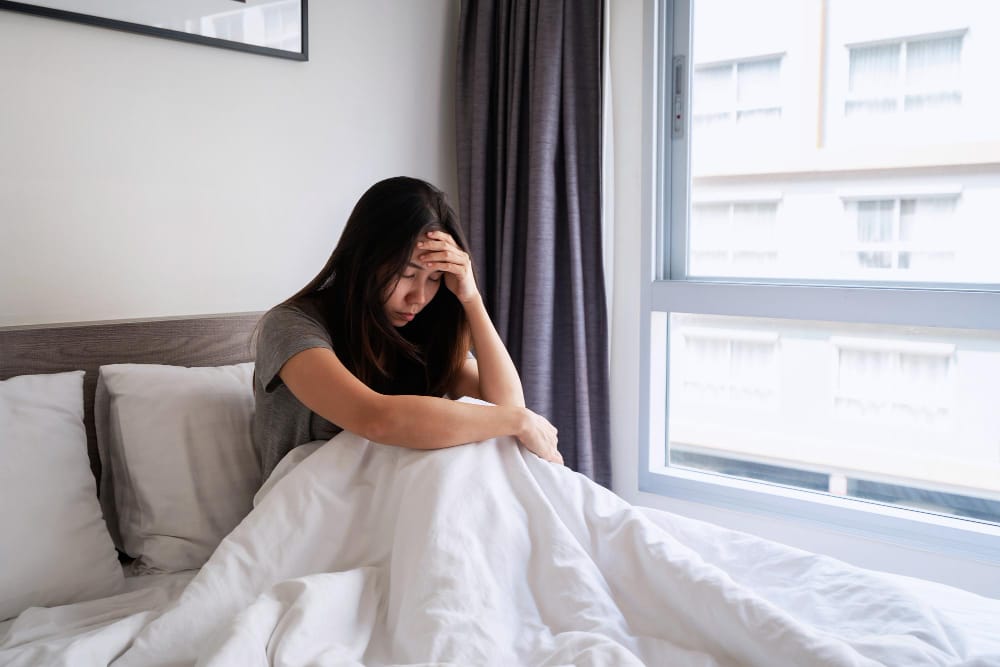Minerals play vital roles in our body that help with just about every bodily function. Potassium is a mineral used by the body for cell membrane transmissions which are how the heart functions, nerve impulse transmissions, and muscle contractions happen. Having low potassium could cause mental fatigue, stress, and anxiety because our body is a complex chemical system. When you lack a particular vitamin or mineral, your system can be thrown off.
We can feel anxious about big events, dangerous situations, and unexpected losses; these anxious feelings are natural for the body to prepare itself for an important event.
You’d also notice how you started to calm down while in the middle of said situation. You begin to breathe easier, and your heart will stop thumping.
Some people experience anxiety and panic attacks for no apparent reason and find it hard to control their worries which affects their ability to go about their daily activities.
Risk factors of anxiety and panic attacks

Generic factors
Mental health issues can be passed down in a family, and if there is a history of anxiety disorders in the family, a person may be more likely to suffer from it.
Environmental factors
Emotional, physical, and sexual abuse or neglect during childhood is linked to anxiety disorders later in life. A traumatic event also increases the risk of posttraumatic stress disorder (PTSD), which can cause panic attacks.
Physical factors
Having other medical conditions like asthma, diabetes, or heart disease can also cause anxiety, use of caffeine, alcohol, or cannabis, and withdrawal from some substances develop anxiety problems when the effects of the substance begin to wear off.
Personality factors
People with certain personality types, such as perfectionists or people who like to be in control, are more prone to anxiety disorders than others are.
Other mental illness
People with other mental health disorders, such as depression, often also have an anxiety disorder.
Symptoms of anxiety disorder
Anxiety disorder symptoms vary, and some people only experience them now and then. However, someone who experiences symptoms for 6 months or longer may have a generalized anxiety disorder (GAD).
Someone with GAD experiences extreme, irrational, and constant anxiety over everyday life. They constantly worry about health, finances, family, friendships, relationships, career, and even death. This can disrupt their daily lives with continual worry, restlessness, disturbed sleep, fatigue, and irritability.
They also suffer physical symptoms such as heart palpitation and increased heart rate, heavy breathing, muscle tension, tightening sensation in the chest, difficulty with concentration and sleep.
If you have at least 3 of the following symptoms for most days for the past 6 months, you should consult a psychiatrist for professional help.
Foods to reduce anxiety
The most common treatment for anxiety, such as relaxation techniques and regular exercise, is effective in reducing anxiety and contributing to emotional well-being.
Psychotherapy can help and is sometimes used together with medication to reduce and eliminate signs and symptoms. All that and a healthy, well-balanced diet to help your body cope and reduce anxiety is worth a try.
Brazil nuts, bread, cereals
These are good food sources for selenium. Selenium may improve mood by reducing inflammation, which is often heightened when someone has a mood disorder, such as anxiety.
Other nuts, animal products, and vegetables, such as mushrooms and soybeans, are excellent sources of selenium too. It is important not to consume too much selenium as it can cause side effects.
The recommended upper limit for selenium for an adult is 400 micrograms (mcg) per day.
Salmon, mackerel, sardines, trout, and herring
These fatty fishes are high in omega-3, a fatty acid that has a strong relationship with cognitive function and mental health. However, recent research has shown that if a person eats too much of another fatty acid, called omega-6, and not enough omega-3, they may increase their risk of developing mood disorders, such as anxiety.
Vitamin D
It can reduce cancer cell growth, help control infections and reduce inflammation. In addition, many of the body’s organs and tissues have receptors for vitamin D, which suggest important roles.
Leafy greens, beans, nuts, dairy foods, and starchy vegetables
Found naturally in many foods and as a supplement. Its primary role in the body is to help maintain normal fluid levels inside our cells. It also helps muscles contract and supports normal blood pressure.
Potassium and sodium are closely interconnected but have opposite effects on the body. Both are essential nutrients that play vital roles in maintaining physiological balance.
Berries, citrus fruits
Great sources of flavonoids, many of the biological effects of flavonoids are related to their ability to modulate several cell-signaling cascades.
Flavonoids have shown anti-inflammatory, anti-thrombogenic, antidiabetic, anticancer, and neuroprotective activities which will be very useful to reduce anxiety and panic attacks.
Turmeric and green tea
Turmeric contains curcumin which may help lower anxiety by reducing inflammation and oxidative stress that often increase in people experiencing mood disorders, such as anxiety and depression.
Green tea contains theanine which has anti-anxiety and calming effects and may increase the production of serotonin and dopamine.
Cheese, yogurt, kimchi, and fermented soy products
One study found fermented foods reduced social anxiety in some young people, while other multiple studies found consuming healthful bacteria increased happiness in some people.
FAQs
What are therapies for anxiety?
Different therapeutic techniques have been developed to treat anxiety and have evolved from psychoanalytic approaches to the newest cognitive-behavioral therapies.
Most of the time, you need to find what works for you since no same person is going through the same situation and feelings as you are. Working closely with your doctor or healthcare provider is the best way to go.
What are different types of anxiety disorders?
Regardless of the specific disorder, the underlying processes that drive them often follow a similar pattern. People with anxiety tend to react to unpleasant thoughts, feelings, and situations more extremely and may try to manage those reactions by avoiding triggers.
Some types of anxiety disorders are Obsessive-compulsive disorder (OCD), Generalized anxiety disorder (GAD), Social anxiety disorder (SAD), Post-traumatic stress disorder (PTSD).
Conclusion
We need to start taking care of our mental health as we do with our physical health. Knowing the root cause of any problem is always the first step in finding the solution to make it better.
Eating a well-balanced diet may not altogether help you avoid anxiety and panic attacks, but it will make you feel better and healthier. That alone should already be considered a win.


